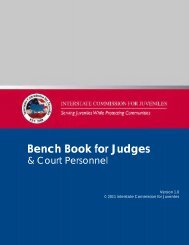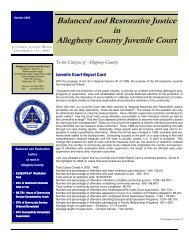News Summary News Summary - Pennsylvania Council of Chief ...
News Summary News Summary - Pennsylvania Council of Chief ...
News Summary News Summary - Pennsylvania Council of Chief ...
Create successful ePaper yourself
Turn your PDF publications into a flip-book with our unique Google optimized e-Paper software.
<strong>News</strong> <strong>Summary</strong><br />
January 22 – February 4, 2011<br />
Probation <strong>Chief</strong> Sheila Mitchell maintained that the "current organizational structure provides a<br />
holistic approach to service delivery for our clients." In a letter to her staff describing the<br />
commissions' recommendations, Mitchell noted that her department has focused on detention<br />
alternatives, correcting racial imbalances and improving its juvenile ranches.<br />
"While our work is always evolving," she wrote, "staff has remained committed to learning new<br />
skills that have resulted in improved outcomes for our clients."<br />
Opinion: Let's end the secrecy in juvenile court<br />
San Jose Mercury <strong>News</strong> (CA)<br />
By Leonard Edwards, Special to the Mercury <strong>News</strong><br />
January 29, 2011<br />
http://www.mercurynews.com/opinion/ci_17222731?nclick_check=1<br />
A foster child dies while in care. The media contact the children's services agency and ask what<br />
happened. The agency responds that it cannot reveal any <strong>of</strong> the facts because the law requires<br />
that the matter remain confidential. The media next contact the juvenile court judge who responds<br />
that there will have to be a hearing before the release (if any) <strong>of</strong> information relating to the death.<br />
The media is outraged. The public wonders about the secrecy surrounding the child's death and<br />
whether the agency and the court are trying to hide something.<br />
California's juvenile courts are closed to the public. For a number <strong>of</strong> reasons, this policy has not<br />
served juvenile courts or the public well. It is time to open the juvenile court to public scrutiny. Here<br />
is my proposal.<br />
Welfare and Institutions Code sections 346 and 676 restrict public access to the juvenile court, but<br />
permit the judge to permit those persons who the court finds "have a direct and legitimate interest<br />
in the particular case or the work <strong>of</strong> the court."<br />
In practice, most juvenile courts in California remain closed to the public. Judges are<br />
understandably reluctant to admit into the courtroom anyone other than those persons directly<br />
involved in the individual case being heard.<br />
I suggest that the legal presumption should be for open court hearings with the judge having the<br />
right to restrict access on a case-by-case basis.<br />
That is what Assemblyman Mike Feuer, D-West Hollywood, has proposed by introducing AB 73.<br />
Several good reasons support this proposal. First, many in the public, including the media, regard<br />
court proceedings as public affairs. They argue that the public has a legitimate and compelling<br />
interest in the important work <strong>of</strong> our juvenile courts.<br />
Second, some argue that openness will encourage all participants in the juvenile court process to<br />
comply with the law and produce fair, timely, and effective justice. If the judge, the attorneys, and<br />
the parties know that the public is watching, they will improve their performance.<br />
48








